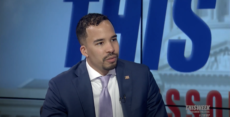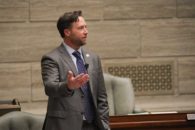Last month when Governor Mike Parson called a special session of the Missouri General Assembly to focus on the real crisis of the sheer volume of murders in the City of St. Louis there was an instant push back from elected Democrats who have run the city for generations and a collective yawn from the rest of the state likely because they don’t believe there is anything that can be done about it.
Anytime you’re talking about legislative politics there are two games: the inside game and the outside game.
Let’s talk about the inside game of the public policy aspects of this and the election year ramifications of handling St. Louis crime.
First of all, I thank Governor Parson, and especially Attorney General Eric Schmitt deserve credit, for stepping up and taking on the most complicated public policy dilemma of our time in St. Louis crime. They could just as easily step back and attack the Democrats who have run every aspect of that city for decades and offer no solutions that could be criticized.
You know, play politics with it.
Instead the Governor has stepped up and offered some solutions that might help the problem. Now with that comes some responsibility because if the Governor gets all or most of his proposals and the murder rate doesn’t go down, then he will be blamed.
In reality, the person with the most to lose — and I don’t really see anything to gain — is Schmitt. If they pass concurrent jurisdiction and he starts taking cases from current Circuit Attorney Kim Gardner, then he better win them — and most of them. And remember the same people who have overwhelmingly elected Gardner twice are the same people who these jury pools will be drawn from.
There is so little political upside to this for Schmitt that you have to at least admire the courage for diving into a political storm like this one. Even if you question the politics of it for a rising national republican star.
There are several arguments against what they are doing. First of all, Gardner was just re-elected in a landslide. Also, I wonder how realistic it is to pass tougher crime laws without speaking at all to the police reform issues that many Missourians have raised.
However, the point I keep coming back to is that literally every single person sees this huge problem that directly or indirectly affects every single Missourian, and no one but Parson has offered any real ideas to do anything about the skyrocketing murder rates in the city.
Where is the crime plan from the Democrats in St. Louis or from the Democrats in Jefferson City for that matter. Jane Dueker asks for one nearly hourly on Twitter, and I never see any response except defund the police or other such nonsense.
Until there are credible plans that have some realistic hope of reducing the murder rate in the City of St. Louis being offered by the democrats how can you ask rational, logic-based people to take the attacks on the Governor’s plan seriously?
St. Louis is the economic engine of the state, more accurately the suburbs are, but still. The fact is the biggest thing holding back St. Louis County is the murder rate in the city. You may be from Afton or from Florissant, but to the rest of mankind, you are from St. Louis.
Us folks outstate don’t like to admit it, but the truth is more than a third of the state’s revenue comes from the St. Louis area. A St. Louis problem does affect every Missourian even though we don’t enjoy admitting it.
Now about the politics. One of the keys to knowing something is political is that someone says, “this isn’t about politics.” Of course this is political; everything is.
In the weeks before the election, having St. Louis murders at the forefront of the conversation is great for Parson, but perhaps more importantly, it presents a challenge to Auditor Nicole Galloway.
Does she support the police unions and the majority of the Senate Democratic Caucus and back a crime bill, thereby angering her left wing supporters in the city?
Or does she back Gardner and the current approach, thereby angering suburban folks in Chesterfield and Kirkwood who care about safety, and who she has to have to win an upset in the fall?
Also, let me use my Stein of Knowledge to predict what would be at the top of the news if St. Louis murders were not in the news: It would be all about schools opening and covid.
This is how it would and probably still will go. A fourth grader in Chesterfield or Lee’s Summit will be in the lunch line and take his mask off because he can’t breathe. Someone will take a picture. It will be posted to the internet. The Post and the Star will lose their minds, and a crisis will be declared. Everyday. All day. Until the polls close at 7:00 pm on November 3rd.
Now let’s talk about the inside game. Honestly, it’s been sloppy.
There are two types of special sessions. One is where the legislative leaders get in a room, all sign off on a plan, and then go execute it. Then there is China Hub.
This one is so close to China Hub, it could catch the Wuhan virus.
No one was excited about this crime plan, not because they were against most of the parts of it, but because most people don’t think there is a solution to St. Louis murders and don’t want to pass a bill because then they would own the problem.
There should have been more communication from the Governor’s Office to the legislative leaders. In turn, the House and Senate should have communicated more.
You would imagine that if the Speaker would have told the Senate he would not pass the bill with the juvenile language in it, then the Senate would have nixed it, and five Senate Democrats wouldn’t have had to take a tough vote for what looks like now for no reason.
Honestly, it looked if not sloppy, then sneaky the way that the call was extended after the Senate had passed a bill and the House had held a hearing on the senate bill.
Good for Rep. David Gregory for putting the institution and the process ahead of some sloppy plan and demanding a hearing on a major shift in Missouri public policy and not adding it as an amendment 10 minutes before exec’ing a bill out of committee.
There is a real argument to be made for concurrent jurisdiction. Today over 150 Missourians have been murdered in the City of St. Louis this year … Think about that 150 Missourians have been murdered since the first of the year. There is a crisis.
In hindsight, it would have been better to just put it all out at once and make the case.
The one thing you would hope that doesn’t happen is that a PQ is floated in the Senate on any of this.
These are big issues, no question, but no issue is worth a PQ.
The difference between a senator and just a House member with a bigger office is supporting PQs.
I can’t imagine my senator, Doug Libla, who has been a senator’s senator from day one, ending his career smearing the Senate with a PQ.
Further, you know the other difference between a senator and a House member posing as a senator? They claim that they are real senators adamantly against the PQ, right up until it’s their issue on the floor.
No bill is bigger than the Senate, not even yours.
You know I developed my love for the senate, and its traditions? Listening to the stories and opinions on the Senate during late night filibusters from Senators like Mike Parson and Eric Schmitt, and Doug Libla.
This has been sloppy, but you have to think at the end of the day they pass a bill and claim victory. It appears it won’t have anything with juvenile certification, but it will at least be a plan.
A plan to address the largest crisis in our state.
While reasonable people can criticize that plan, I’d ask, what is the plan those critics are offering?
Or are some people just playing politics?
This week “Show Me Missourah” is back from our COVID-19 break so check us out, and Sunday on “This Week in Missouri Politics” our guest will be Governor Mike Parson from the State Fairgrounds in Sedalia.
Scott Faughn is the publisher of The Missouri Times, owner of the Clayton Times in Clayton; SEMO Times in Poplar Bluff; and host of the only statewide political television show, This Week in Missouri Politics.








































